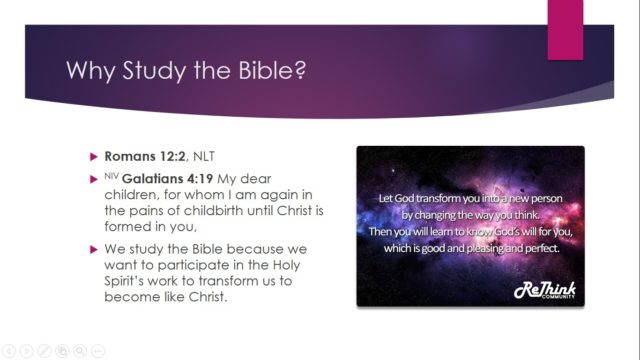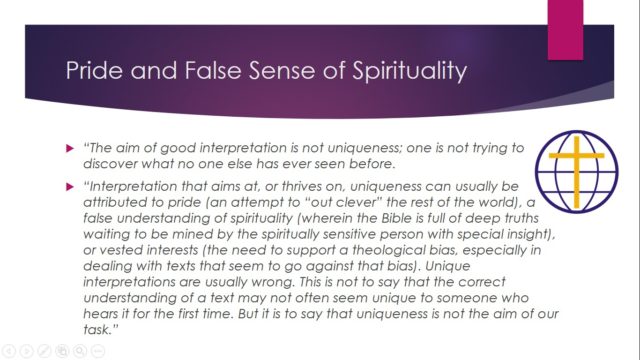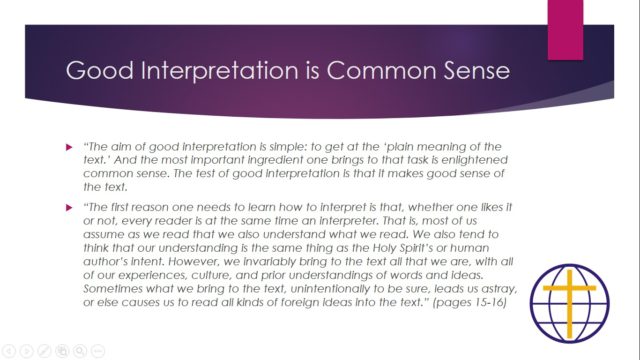In English grammar, the indicatives and imperatives are verbs that denote mood. Indicatives are statements of fact or reality while the imperatives are used to give “orders, commands, warnings or instructions.”
In the Bible, the indicatives are statements of what are already true in Christians even at the present time. On the other hand, the imperatives are usually the responses that are expected of Christians in view of the indicatives. These two usually go together. This pattern can be found in Scripture. It is helpful if we are aware of this fact. They go hand in hand.
Unfortunately, some people misunderstand and tend to emphasize one over the other. Some may emphasize the indicatives while disregarding the imperatives and vice versa. The Bible on the other hand clearly shows that both are important.
The imperatives are our responses to the truth of who God is as revealed in Jesus Christ and who we are in him. In view of the truth of God’s good news in Jesus Christ (indicative), we cannot but respond joyfully, positively and even enthusiastically (imperative).
It’s about relationships. God has initiated this relationship with us by reconciling us to himself (indicative). As a positive response to this loving relationship, we gladly welcome God’s loving embrace with joy and excitement and embrace the Lord in return (imperative)! This is not a mechanistic, legalistic response to the conditions of a contract. This is a loving relationship between God and the Christian. It is a loving response in a loving relationship between God and the Christian.
Paul said that it is the grace of God that teaches us to say “No! to ungodliness and worldly passions, and to live self-controlled, upright and godly lives in the present age” (Titus 2:11-12). The good news of grace (indicative) teaches us and compels us to resist ungodliness and to live upright and godly lives (imperative).
We should have a balanced view about the indicatives and imperatives in the Bible and not tip to one side or the other. Both are important as shown in Scripture.
Examples of Imperatives and Indicatives of Grace
Example 1:
Indicative: God has in Christ already reconciled the world to himself. This is already true. (2 Cor. 5:18-19).
Imperative: Since this is already true that all have already been reconciled in Christ, our response is for us to be reconciled back to God! (2 Cor. 5:20). Through Paul’s letter, we are encouraged to not just accept the truth about our present reality in Christ but to also respond joyfully and positively by actually getting reconciled back to God. Our response should not be looked upon as a forced response or obligation due to the demands of a legal contract but a loving response to a wonderful good news. That’s the way to look at it. It is a loving relationship between God and man — not a contract.
Example 2:
Indicative: According to Paul, Christians have already been raised in Christ (Col. 3:1). That is already their present status in Christ. It’s already a reality.
Imperative: Since that is already the truth and reality for Christians, therefore Paul urged them to set their hearts on things above. (Col. 3:1-2).
The indicatives of grace do bring along with it the imperatives of grace. Both go hand in hand and should both be emphasized as we share the good news to others. Again, it should not be looked upon as a forced obligation to be fulfilled due to a contract. Rather, it is a loving response to a loving and gracious God.
Example 3:
Indicative: Christians have already died in Christ. Their life is hidden with Christ in God. Christ is the Christian’s life. Christians will appear with Christ in glory. This is the Christian’s truth and reality right now as well as their future destiny (Col. 3:3-4).
Imperative: In view of the Christian’s reality in Christ, Paul urged them to put to death sin which are in them. This is not sin management in order to be saved. Paul was reminding Christians to act according to who they really were in Christ. (Col. 3:5). A positive, joyous response is expected because of the wonderful good news of who Christians already are in Jesus Christ.
Example 4:
Indicative: Christians have already taken off the old self and have put on the new self (Col. 3:9-10). This is the present status of Christians.
Imperative: Therefore, as God’s chosen people, holy and dearly loved, clothe yourselves with compassion, kindness, humility, gentleness and patience. Bear with each other and forgive whatever grievances you may have against one another. Forgive as the Lord forgave you (Col. 3:12-13).
Example 5:
Indicative: Christians are already children of God. That is their present truth and reality in Christ. That is who they are in Christ. They will be like Christ with glorified bodies at his second coming — future reality (1 John 3:1-2).
Imperative: In light of who Christians are in Jesus Christ, in light of the hope of a future resurrection and glorification, John was urging them to purify themselves! (1 John 3:3). Those who are sinning are practicing lawlessness or wickedness (1 John 3:4).
Example 6:
Indicative: According to Paul, Christians had already received the Holy Spirit (Rom. 8:15). Again, that was their present status in Christ. This is the indicative statement.
Imperative: Therefore, Paul said that these Christians had an “obligation” to live according to the leading of the Holy Spirit and not according to their sinful nature (Rom. 8:12). This is the imperative statement.
These are just some examples I gathered randomly from the Bible. The Bible is filled with the indicatives and imperatives of God’s grace. Both are important and they usually go together. The indicatives of grace does indeed bring about the imperatives of grace. Again, this is not about a legal contract but about a loving relationship between God our Father and with us his children in the Lord.
For Further Reading:
Updated: 8/8/17













